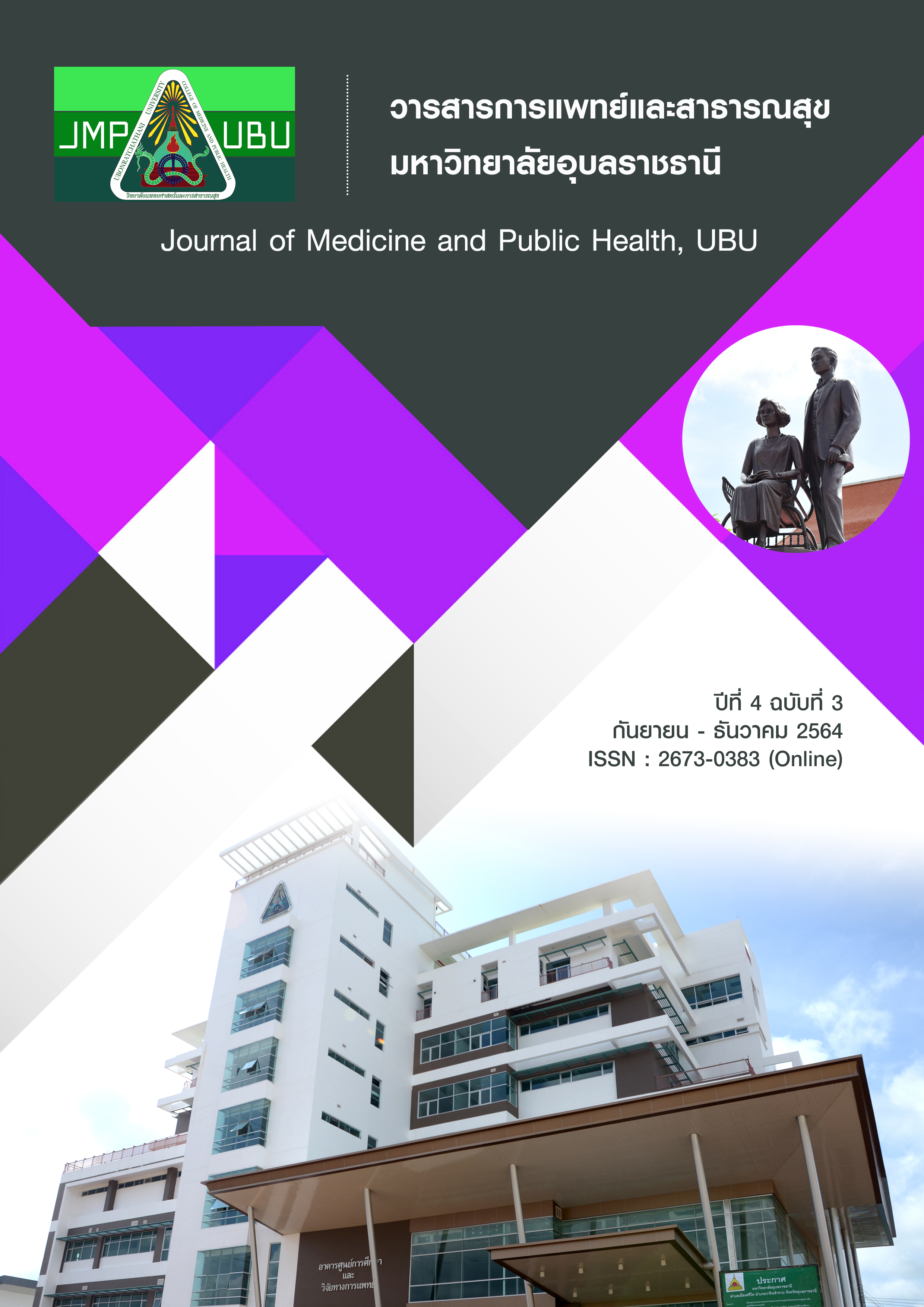รูปแบบการบริโภคอาหารเสริมของกลุ่มชายรักชายในจังหวัดเชียงใหม่
คำสำคัญ:
การบริโภคอาหารเสริม, เกย์รุก, เกย์รับ, เกย์แบบผสมผสานบทคัดย่อ
การศึกษานี้มีวัตถุประสงค์เพื่อศึกษารูปแบบการบริโภคอาหารเสริมของกลุ่มชายรักชายในจังหวัดเชียงใหม่ โดยใช้แนวคิดฮีจีโมนิก แอสเทติก เป็นกรอบของทฤษฎีการวิจัยและใช้วิธีการศึกษาแบบชาติพันธุ์วรรณาแบบเร่งด่วนและ การสัมภาษณ์เชิงลึกกับกลุ่มเป้าหมายใช้การเลือกแบบเฉพาะเจาะจง 15 คน โดยเก็บข้อมูลผ่านการใช้แนวคำถามทัศนคติเกี่ยวกับการบริโภคอาหารเสริมในระดับบุคคล ครอบครัว องค์กร ชุมชน และนโยบายสาธารณะ ก็บข้อมูลในช่วงกันยายน-ธันวาคม 2563 ผลการศึกษาพบว่า เกย์รุกนั้นมีความสนใจในรูปร่างที่มีความแข็งแรงทำให้เน้นไปในเรื่องของการเสริมสร้างกล้ามเนื้อและลดไขมันของร่างกาย เกย์รับต้องการมีผิวพรรณที่ดี ขาวใส และส่งเสริมบุคลิกภาพ การบริโภคอาหารเสริมจึงเน้นในเรื่องของการช่วยในเรื่องผิวพรรณ และการลดไขมันในร่างกายแต่ไม่เท่ากับในกลุ่มเกย์รุก เกย์แบบผสมผสานนั้นต้องการมีกล้ามเนื้อที่สมส่วน ต้องการมีผิวพรรณที่ดูดีแต่ไม่ได้ต้องการที่จะมีผิวพรรณที่ขาวจนเกินไป และสิ่งที่พวกเขาให้ความสำคัญก็คือ บุคลิกภาพที่ดูดีแบบองค์รวม รูปแบบการบริโภคอาหารเสริมเน้นไปในเรื่องของการเติมเต็มโภชนาการให้ครบถ้วนและไม่ได้เน้นอย่างใดอย่างหนึ่งเกินไป รูปแบบการบริโภคอาหารเสริมนั้นจะเห็นได้ชัดว่ามีความแตกต่างกันแต่เป้าหมายหลักเน้นไปเพื่อทำให้ตัวเองมีบุคลิกภาพที่ดีซึ่งสอดคล้องกับแนวคิด ฮีโมจีนิก แอสเทติก ที่ส่งผลกับบรรทัดฐานของเพศที่สะท้อนออกมาให้เห็นในรูปแบบของร่างกาย จึงควรประเมินขนาดการบริโภคที่เหมาะสมเพื่อเป็นการป้องกันปัญหาสุขภาพที่จะตามมาในอนาคตได้
Downloads
เอกสารอ้างอิง
Pooja D, Neha J, Upendra N. Nutraceutical An overview of regulations. International Journal of Pharmacy and Life Science 2018; 9(3): 5762-66.
Bailey RL, Gahche JJ, Lentino CV, Dwyer JT, Engel JS, Thomas PR, et al. Dietary supplement use in the United States, 2003-2006. J Nutr 2011;141(2):261-6.
Tomoko Imai et al. Dietary Supplement use by Community-living Population in Japan 2006. Journal of Epidemiology 2006;16:249.
Ronis MJJ, Pedersen KB, Watt J. Adverse Effects of Nutraceuticals and Dietary Supplements. Annu Rev Pharmacol Toxicol 2018;58:583-601.
Or Flora, Kim Yongjoo, Simms Juliana, Austin S. Bryan. Taking Stock of Dietary Supplements' Harmful Effects on Children, Adolescents, and Young Adults. J Adolesc Health 2019;65(4):455-61.
เรย์ณพัศ ภาสกร, ยุบล เบ็ญจรงค์กิจ. รูปแบบการดำเนินชีวิต พฤติกรรมการบริโภค และการเปิดรับสื่อของชายรักชายในเขตกรุงเทพมหานคร. วารสารการประชาสัมพันธ์และการโฆษณา 2561;5:15-21.
Boehmer U, Miao X, Linkletter C, Clark MA. Adult health behaviors over the life course by sexual orientation. Am J Public Health 2012;102(2):292-300.
Elyamany N. A Multimodal Analysis of Representation of Hegemonic Masculinity and Hegemonic Femininity on Men’s Health and Women’s Health Cover pages (January 2011- June 2016) Anàlisi. 2018;59:51-76.
Duggan SJ, McCreary DR. Body image, eating disorders, and the drive for muscularity in gay and heterosexual men: the influence of media images. J Homosex 2004;47(3-4):45-58.
Griffiths S, Murray SB, Dunn M, Blashill AJ. Anabolic steroid use among gay and bisexual men living in Australia and New Zealand: Associations with demographics, body dissatisfaction, eating disorder psychopathology, and quality of life. Drug Alcohol Depend 2017;181:170-6.
Charlesworth S, Baines D. Understanding the negotiation of paid and unpaid care work in community services in cross-national perspective: the contribution of a rapid ethnographic approach. Journal of Family Studies 2015;21(1):7-21.
Block G, Jensen CD, Norkus EP, Dalvi TB, Wong LG, McManus JF, et al. Usage patterns, health, and nutritional status of long-term multiple dietary supplement users: a cross-sectional study. Nutr J 2007;6:30.
McLaughlin J, Coleman-Fountain E. The unfinished body: the medical and social reshaping of disabled young bodies. Soc Sci Med 2014;120:76-84.
Deldicque L, Francaux M. Potential harmful effects of dietary supplements in sports medicine. Curr Opin Clin Nutr Metab Care 2016;19(6):439-45.
Gill R, Henwood K, McLean C. Body Projects and the Regulation of Normative Masculinity. Body & Society 2016;11(1):37-62.
ดาวน์โหลด
เผยแพร่แล้ว
รูปแบบการอ้างอิง
ฉบับ
ประเภทบทความ
สัญญาอนุญาต
เนื้อหาและข้อมูลในบทความที่ลงตีพิมพ์ในวารสารการแพทย์และสาธารณสุข มหาวิทยาลัยอุบลราชธานี ถือเป็นข้อคิดเห็นและความรับผิดชอบของผู้เขียนบทความโดยตรง ซึ่งกองบรรณาธิการวารสารไม่จำเป็นต้องเห็นด้วย หรือร่วมรับผิดชอบใด ๆ
บทความ ข้อมูล เนื้อหา รูปภาพ ฯลฯ ที่ได้รับการตีพิมพ์ในวารสารการแพทย์และสาธารณสุข มหาวิทยาลัยอุบลราชธานี ถือเป็นลิขสิทธิ์ของวารสารการแพทย์และสาธารณสุข มหาวิทยาลัยอุบลราชธานี กองบรรณาธิการไม่สงวนสิทธิ์ในการคัดลอกเพื่อการพัฒนางานด้านวิชาการ แต่ต้องได้รับการอ้างอิงที่ถูกต้องเหมาะสม






